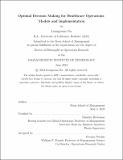Optimal Decision Making for Healthcare Operations: Models and Implementation
Author(s)
Na, Liangyuan
DownloadThesis PDF (18.75Mb)
Advisor
Bertsimas, Dimitris
Terms of use
Metadata
Show full item recordAbstract
Healthcare systems face financial and operational challenges to provide high-quality patient care. Advances in machine learning and scalable optimization have led to opportunities for utilizing analytics to improve healthcare operations. However, only a limited number of models have been extensively deployed in practice due to the complex nature and strict regulations of healthcare systems. This thesis aims to develop and deploy practical analytics models that support strategic, tactical, and operational decision making in healthcare systems.
A large part of the thesis involves close collaborations with Hartford HealthCare (HHC), the largest hospital network in Connecticut, spanning seven hospitals with $5 billion annual revenue. In Chapter 2, we optimize nurse staffing at the Emergency Department (ED) of Hartford Hospital. We develop a two-phase methodology: (a) a robust optimization model to allocate aggregate staffing levels, followed by (b) mixed integer optimization models to schedule each nurse. Then in Chapter 3, we develop machine learning models to predict eight patient operational outcomes related to discharge, mortality, and intensive care for all inpatients at seven hospitals. We build an online daily pipeline from data extraction to prediction-driven decision support.
More importantly, we implement our models into a two-module end-to-end software deployed in large-scale production, supporting daily decision making of over 400 users of doctors, nurses, and managers across seven hospitals at HHC. The nurse scheduling module provides a labor-free process from input collection to schedule output, improving patient coverage and nurse satisfaction with reduced cost. The patient outcome prediction module is deeply integrated into medical providers’ daily workflow, identifying timely discharges and patient exacerbation. HHC reports better staff workflow and patient care, together with substantial benefits in reduced length of stay and increased financial margins.
In the final part of the thesis, we collaborate with a mobile health (mHealth) application, Hearsteps, designed to reduce sedentary behavior and promote physical activity in individuals with hypertension. In Chapter 4, we develop innovative batch off-policy learning methods to optimize the app’s digital intervention by sending anti-sedentary messages to users. Our interpretable decision tree-based policy improves treatment effects and guides future clinical trials.
Date issued
2023-06Department
Massachusetts Institute of Technology. Operations Research CenterPublisher
Massachusetts Institute of Technology